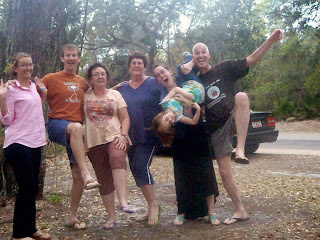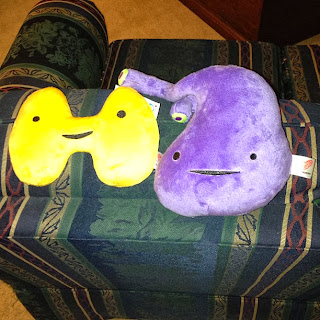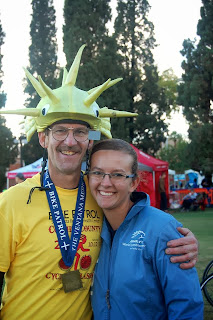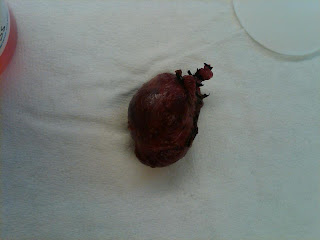 |
| Photo courtesy of Dysautonomia International |
I have been struggling with what to write about for my blog post. I have been reading others about how they won't let dysautonomia beat them (warriors on my team), how treatment sucks (which it does), how they feel trapped by this disease, and how overwhelmed by the love and support they receive from family and friends.
I feel all of the above things. Dysautonomia will never beat me. I am stronger than dysautonomia. I always have been, and always will be. Losing is NOT an option. Postural Orthostatic Tachycardia Syndrome (POTS) does not define me. I am more than POTS. POTS will not beat me. Treatment does suck. There is no protocol. There is no go to guide on how to help dysautonomia be manageable. There is no magic cure, no take this pill twice a day and you will be perfect again in no time. There is no secret to success. There is trial and error. Keep trying until you find something that works for you, and pray that it works for more than just a few months. I do feel trapped by my disease. I am 21 years old and feeling my body fail me. And yet, I continue to be more than it. I am constantly overwhelmed by the love, support, and help that I receive from family and friends. There is nothing to show you how blessed you are by family and friends than being in a time of need. Whenever I find myself doubting something, myself, my ability to keep dealing with this monster, and whenever I am tired of fighting, someone comes along and reminds me why it's worth it and why I continue to do it.
And yet, writing about all of these things isn't exactly what I want to do. What I want to write about is the truth. The truth about living with dysautonomia. I can smile all I want to and pretend that this is something easy to manage, that it doesn't consume my every thought in some way shape or form, that I fear what my future will be like, but none of that is true. What is true is the reality of what my every day is now. The fact of the matter is, I wouldn't trade my life for anything now. Let me show you though, what the reality of life is should you be living with dysautonomia.
Lets start at the very beginning. The morning. My arch nemesis: waking up. It takes me forever to wake up. Of course it does! I am in my 20s! Let me sleep in until 1 in the afternoon for goodness sakes! But I suppose there is work, school, chores, and horses to tend to. Okay. Alarm goes off. An hour and a half for you to get ready. Before you can even get out of bed, you have to drink a whole bottle of water. Why? Because fluids are a crucial part of dysautonomia. Okay, you have had your water. Now you have to start to sit up. Let me put a little picture in here to give you an idea of what happens when someone with POTS go from laying to sitting, or sitting to standing, or any weird combination of any of those:
 |
| Photo credit from http://www.lookfordiagnosis.com/ |
You make it to your destination where you do your tasks at work as you need to. Don't forget all your water though (or even better, gatorade/powerade/electrolytes)! Plus you need to snack throughout the day. Salt salt salt salt! Lot's of salt. It helps to raise your blood pressure! The doctors have told you to salt and fluid load, but to also eat lots of small meals throughout the day rather than three main meals. Well still, lunch time rolls around and you need to eat something. Usually soup, or something light like that. But still, you get in your purse and fumble around for your medication. Trying to pretend you don't see the awkward stares of people knowing what you are doing. Drink more. Eat a little. Keep going. You avoid standing as much as humanly possible. Don't forget to keep drinking your Gatorade! The day goes on and you are exhausted. But the kind of exhaustion that you can't fix from a good nights sleep.
 |
| Photo courtesy of potsproblems.tumblr.com |
Finally the work day is done and you get to go home! That is, unless you have a doctors appointment! (they never seem to really end) You make it home. Crawl through the door. And look what time it is! Med time again! Woohoo! You're too exhausted to cook and feed yourself, but you know you need to anyways. Something easy. Oh look! Soup again. You know on top of that you have other things to do. A part of a the house to clean, laundry to do, all that fun stuff! But you'd rather just go to bed. You end up just laying on the couch, you'll get to the rest some other time. Next time you're feeling well. You decide to go to bed. But first, another round of medication, because it always seems no matter how tired you are, you can never sleep anyways. Finally you fall asleep (or not, if it's a really bad night), just to hear the alarm go off again in the morning.
 |
| Photo courtesy of potsproblems.tumblr.com |
The truth behind dysautonomia is ugly. Nobody wants to live it. Nobody wants to hear about it. But it's true. It's all there. IT STILL EXISTS! Just because nobody wants to confront to truth about it, does not mean it does not exists. POTS symptoms vary from day to day, even just from hour to hour. Dysautonomia and POTS are not rare, they are just rarely diagnosed.
There are lots of ways to help get the word out for dysautonomia. There are many different fundraisers going on this month. However, as with most things, the most important thing is to get the word out. Make a fuss! Whenever someone gets annoyed with my preaching about dysautonomia, I know I am doing my job. I am being heard.
 |
| Photo courtesy of Dysautonomia International |



























